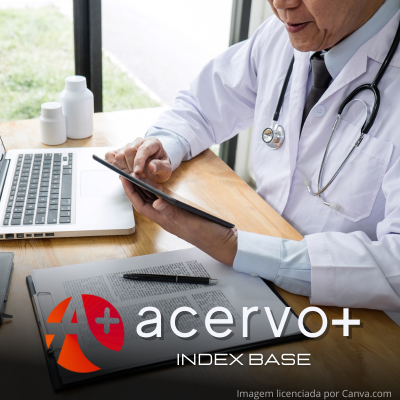Caracterização dos níveis de letramento em saúde e de conhecimento sobre aleitamento materno
##plugins.themes.bootstrap3.article.main##
Resumo
Objetivo: Caracterizar os níveis de letramento em saúde e de conhecimento sobre aleitamento materno de puérperas internadas em alojamento conjunto. Métodos: Trata-se de um estudo transversal, de abordagem quantitativa, realizado num hospital de referência em atenção materno-infantil, no setor do alojamento conjunto e no período de julho de 2022 a janeiro de 2023. A amostra foi composta por 70 puérperas. Para a caracterização do nível de conhecimento sobre o aleitamento materno foi utilizado questionário tipo Likert de cinco pontos da NOC. Já os níveis de LS foram avaliados através do Teste de Letramento em Saúde (TLS). Resultados: Foi identificado que 51,43% das participantes apresentaram conhecimento substancial sobre o tema. Apenas 10% apresentaram conhecimento limitado, 18,57% conhecimento moderado e em 20% foi caracterizado conhecimento vasto, sendo este o nível máximo. Com relação aos níveis de LS, constatou-se que 48,57% das puérperas apresentaram letramento adequado, seguido de 30% com letramento limitado e 21,43%, apresentando letramento inadequado. Conclusão: Os achados deste estudo tornaram evidentes possíveis dificuldades no processamento do conhecimento, de forma que a autonomia das entrevistadas, sobre suas condições de saúde, pode estar prejudicada.
##plugins.themes.bootstrap3.article.details##
Copyright © | Todos os direitos reservados.
A revista detém os direitos autorais exclusivos de publicação deste artigo nos termos da lei 9610/98.
Reprodução parcial
É livre o uso de partes do texto, figuras e questionário do artigo, sendo obrigatória a citação dos autores e revista.
Reprodução total
É expressamente proibida, devendo ser autorizada pela revista.
Referências
2. CHAN MY, et al., The effect of a self-efficacy-based educational programme on maternal breast feeding self-efficacy, breast feeding duration and exclusive breast feeding rates: A longitudinal study. Midwifery [Internet]. 2016. 36:92–98.
3. DEL CIAMPO LA, DEL CIAMPO IRL. Breastfeeding and the Benefits of Lactation for Women’s Health. Rev Bras Ginecol e Obs [Internet]. 2018 Jun 1 [cited 2023 Mar 15];40(6):354–359.
4. EIDELMAN AI, et al., Breastfeeding and the Use of Human Milk. Pediatrics [Internet]. 2012, v 129(3):e827–841.
5. França AS, et al. Evaluating Health Literacy among Adolescent and Young Adult Pregnant Women from a Low-Income Area of Northeast Brazil. Int J Environ Res Public Heal 2020, Vol 17, Page 8806 [Internet]. 2020 Nov 27 [cited 2023 Mar 15];17(23):8806.
6. HARRISON MS, et al., A prospective population-based study of maternal, fetal, and neonatal outcomes in the setting of prolonged labor, obstructed labor and failure to progress in low- and middle-income countries. Reprod Health. 2015;12(2):1–10.
7. KILFOYLE KA, et al., Health Literacy and Women’s Reproductive Health: A Systematic Review. https://home.liebertpub.com/jwh [Internet]. 2016 Dec 1 [cited 2023 Mar 15];25(12):1237–1255. 4.
8. KUMEH OW, et al., Literacy is power: structural drivers of child malnutrition in rural Liberia. BMJ Nutr Prev Heal [Internet]. 2020. 3(2):295.
9. LUMBIGANON P, et al., Antenatal breastfeeding education for increasing breastfeeding duration. Cochrane Database Syst Rev [Internet]. 2016. 1-79.
10. MARQUES SRL, et al., Letramento em saúde e autopercepção de saúde em adultos usuários da atenção primária. CoDAS [Internet]. 2018 May 17 [cited 2023 Mar 15];30(2):e20170127.
11. MOORHEAD S, et al., NOC Classificação dos Resultados de Enfermagem - Google Livros [Internet]. Rio de Janeiro: Elsevier, 2016; 86p.
12. Organization WH. Closing the gap in a generation Health equity through action on the social determinants of health Commission on Social Determinants of Health FINAL REPORT | EXECUTIVE SUMMARY. In: Geneva: Commission Social Determinants of Health (CSDH). 2008.
13. OSBORNE RH, et al., The grounded psychometric development and initial validation of the Health Literacy Questionnaire (HLQ). BMC Public Health [Internet]. 2013.
14. Sahin E, Yesilcinar I, Geris R, Pasalak SI, Seven M. The impact of pregnant women’s health literacy on their health-promoting lifestyle and teratogenic risk perception. 2020. 598–610.
15. SARDINHA DM, et al., Promoção do aleitamento materno na assistência pré-natal pelo enfermeiro. Rev Enferm UFPE line [Internet]. 2019: 852–7.
16. SCHREIDER A, et al., Avaliação do letramento em saúde e conhecimento sobre Terapia Renal Substitutiva de pacientes em um ambulatório multiprofissional de Doença Renal Crônica pré-dialítica. HU Rev. 2020 Aug 17;46:1–9.
17. STAFFORD JD, et al., Health Literacy and Associated Outcomes in the Postpartum Period at Grady Memorial Hospital. Matern Child Health J [Internet]. 2021;25(4):599–605.
18. THOMAS SD,et al., Conditions and Dynamics That Impact Maternal Health Literacy among High Risk Prenatal-Interconceptional Women. Int J Environ Res Public Heal 2018, Vol 15, Page 1383 [Internet]. 2018:1383.
19. VALERO-CHILLERÓN MJ, et al., Health literacy and its relation to continuing with breastfeeding at six months post-partum in a sample of Spanish women. Nurs Open [Internet]. 2021.
20. VAMOS CA, et al., “I Didn’t Know”: Pregnant Women’s Oral Health Literacy Experiences and Future Intervention Preferences. Women’s Heal Issues. 2019:522–8.
21. VILA-CANDEL R, et al. Interventions to Improve Health among Reproductive-Age Women of Low Health Literacy: A Systematic Review. Int J Environ Res Public Heal 2020, Vol 17, Page 7405 [Internet].
22. VILA-CANDELl R, et al. Health literacy of pregnant women and duration of breastfeeding maintenance: A feasibility study. J Adv Nurs [Internet]. 2021:703–14.
23. YEE LM, et. Health Care Providers’ Perspectives on Barriers and Facilitators to Care for Low-Income Pregnant Women With Diabetes. Diabetes Spectr [Internet]. 2020.
24. YEE LM, et al. Association of Health Literacy Among Nulliparous Individuals and Maternal and Neonatal Outcomes. JAMA Netw Open [Internet]. 2021.

